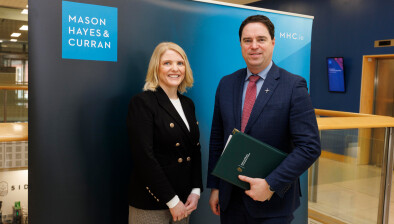MHC: White collar crime ‘not sufficiently enforced’ in Ireland

Peter Johnston
The vast majority of industry professionals do not believe white collar crime is sufficiently enforced in Ireland, according to a recent survey by business law firm Mason Hayes & Curran.
A survey of over 200 attendees at the firm’s recent whistleblowing and white collar crime webinar found that 85 per cent do not believe white collar crime is enforced.
The event focused on the recent Protected Disclosures (Amendment) Act 2022, which imposes significant obligations on employers in Ireland to facilitate and support workers in making protected disclosures internally and has a knock-on impact for white collar crime.
Peter Johnston, MHC partner, said: “Proving white collar crime is notoriously difficult. The recent establishment of the Corporate Enforcement Authority, with its increased powers and resources, should increase the investigation and enforcement of company law breaches which will in time hopefully address the perceived lack of enforcement.”
A quarter of respondents said their organisation had received a protected disclosure alleging serious wrongdoing in the last three years. Additionally, 15 per cent of organisations do not have a process in place where a worker can make a protected disclosure.
Elizabeth Ryan, partner, said employers with more than 50 employees have a duty to “establish, maintain and operate internal reporting channels and procedures”.
She said the new legislation “requires employers who receive a protected disclosure to acknowledge receipt of the disclosure within seven days. They must also follow up diligently on the disclosure, which may include an investigation. Importantly, employers are not legally obliged to follow up on anonymous disclosures.”
The Act expands the definition of workers to include job applicants, shareholders, members of boards and volunteers. Ms Ryan noted: “It is important to ensure all workers, even if they are external to an organisation, are aware of its reporting channels and procedures.”
The list of actions which could constitute penalisation has been expanded to include negative performance assessments, harm to reputation via social media and psychiatric or medical referrals.
Liam Guidera, partner, noted that one of the important questions he would ask his clients at the outset of a protected disclosure investigation is: “What is the scope of this protected disclosure, is potential criminality being alleged and what is the aim or purpose of the investigation?”
Four-fifths of respondents do not believe workers who make a protected disclosure should receive a monetary award, which is currently the case in other countries such as America. A speaker at the event, Steve Young, CEO of the Association of Corporate Investigators, said: “Generally, we support reward programmes to encourage whistleblowers to come forward.”









